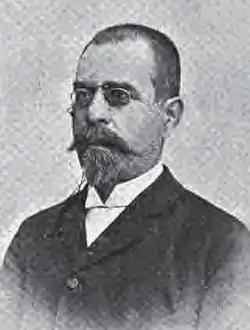
Constantine Sathas (Greek: Κωνσταντίνος Σάθας; Athens, 1842 – Paris, 25 May 1914)[1] was a Greek historian and researcher.
Sathas spent his life unearthing hitherto unknown material pertaining to the history of late medieval and early modern Greece that he later published. He researched archives in Greece, Constantinople (now Istanbul), Venice and Florence. In 1900, he moved to Paris, where he lived until his death.
Many of the numerous documents he brought to light still remain primary sources of information. It can be argued that his work was never fully appreciated and some of his views are regarded eccentric nowadays.[2] Yet, he carried out groundbreaking work and has been considered as the best historian of Greece in the 19th century.[3]
Selected works
In Greek
- The Revolution of the Greek nation in 17th century, Athens, 1865.
- The chronicle of Galaxeidi, 1865.
- Hellenika Anekdota (Unpublished Greek texts), (2 volumes), 1867.
- New Greek Philology. Biographies of illustrious literary Greeks ... 1453 to 1821. 1868.
- Greece under Turkish occupation, 1869.
- Medieval Library (7 volumes), 1872-1894.
- Historical essay on the theatre and music of the Byzantines, 1878.
- Cretan theatre, or a collection of unpublished and unknown dramata, 1879.
- Greek Stratioti in the West and the revival of the Greek military tactics, 1885.
In French
- Documents inédits relatifs à l'histoire de la Grèce au Moyen Âge publiés sous les auspices de la Chambre des députés de Grèce, Paris, 1880-1890. 9 volumes in French, Italian and Latin languages.
- Sur les Commentaires byzantins sur Menandre, Homere, etc.: Notice et textes grecs inédits, Paris, 1876.
- Deux lettres inedites de l'empereur Michel Ducas Parapinace à Robert Guiscard rédigées par Michel Psellus, Paris, 1875.
- La tradition hellenique et la legende de Phidias de Praxitele et de la fille d'Hippocrate au moyen age, Paris, 1875.
- Les exploits de Digenis Akritas: Epopee byzantine du dixième siècle / publiée pour la première fois d'après le manuscrit unique de Trebizonde., Athens, 1875. (with Emile Legrand)
In English
- He collaborated with J.B. Bury and others for an edition of the History of Michael Psellus (Methuen & Co. London, 1899).
External links
References
- ↑ R., S. (1914). "Constantin Sathas". Revue Archéologique. 23: 429–430. ISSN 0035-0737. JSTOR 41033737.
- ↑ Siniossoglou, Niketas (2011). Radical Platonism in Byzantium. Cambridge University Press. pp. 50–51. ISBN 9781107013032.
It is worth evoking here the pioneering theory of Konstantinos Sathas regarding the survival of pagan Hellenism within Byzantium. Sathas did not maintain that paganism ultimately shaped the Christian mysteries from inside, as Protestant and deist philosophers had done. Rather, Sathas, nowadays considered eccentric and very rarely (if at all) remembered by modern Byzantinists, argued in favour of a covert pagan movement operating within the Christian Empire and bowing to clerical hegemony while maintaining its own distinct identity.
- ↑ Thompson, James Westfall; Holm, Bernard J. (1942). A History of Historical Writing. New York: Macmillan. p. 643.
The best historian of Greece in the last century was Constantine Sathas